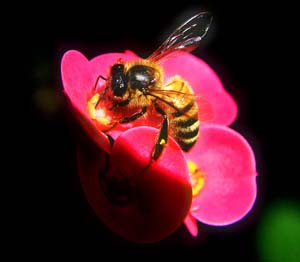 “You’re sweet as a honeybee
“You’re sweet as a honeybee
But like a honeybee stings
You’ve gone and left my heart in pain”
– The Four Tops
It seems like animal week at ye Fresh Living! But I got this fascinating fact sheet from a publicist representing Dr. Reese Halter, author of The Incomparable Honeybee, and since my heart’s been in pain over the honeybee sitch, I had to post on it.
Surely you’ve heard that honeybees have been vanishing at alarming rates. But maybe like me you didn’t know much more than othat other that it being seriously bad news, not just for honey lovers, but for strawberry and other fruit lovers (they pollinate the crops) too. Not to mention eco-system lovers because it’s unclear exactly how massive the impact would bee if we lost all our buzzy friends. So, read on! And forward on!
Facts on the State of the Honeybee
1) They are the most important pollinator on Earth. Every third bite on your plate of food comes from the honeybee!
2) They are dying en masse!
3) We need to reduce the amounts of insecticides, herbicides, fumicides and miticides used.
4) Many farmers combine or stack their chemicals to reduce application costs, however, stacking chemicals is known to increase toxicity levels in some cases by 1,000 fold.
5) We need more beekeepers and we need them to be locals. Currently bees are transported across the nation following the flowering of different crops – in the past they were fed corn syrup and high fructose instead of honey.
6) Honeybees were designed to eat a smorgasbord of pollens* (pollens build larvae, brains, and autoimmune systems).
7) Currently they are worked in mono-culture plantations and if the pollen is infertile – the bees get sick.
8) Insecticides are systemic (carried throughout the plant) and recently 60% of pollen samples in 23 states contained high levels of toxicity. The toxicity is carried back to the hives and evident in the beeswax.
9) Climate change is dramatically affecting the timing of flowering (and the native bees time their entire life cycle to the timing of plant flower) and it’s affecting their pollen (evidence shows that certain plants are responding to climate change by producing infertile pollen, infertile pollen has no protein and the bees require protein – see above.
10) Electro magnetic radiation from powerlines, cell phone towers and cordless phones are deleterious to all life forms, humans and bees are included!
11) Honeybees contribute at least $44 billion a year to the U.S economy pollinating crops like almonds, apples, avocados, blueberries, broccoli, canola, carrot seeds, cherries, citrus, cranberries, cucumbers, grapes, lettuce, macadamizes, melons, peaches, plums, pumpkins, onion seeds, squash, sunflowers, kiwis, tomatoes, zucchinis, (to name only a few!); alfalfa and clover for beef and dairy industries; cotton for our clothes; honey, candles and medicines.
What Can You Do to Support the Honeybee?
1) Support organics.
2) Support our local beekeepers by buying their honey. DO NOT buy generic honey as China supplies one third of all the honey consumed in the U.S (China allows many chemicals that are banned elsewhere and toxic residues are transferred into honey).
3) Purchase organic cotton.
4) This spring plant native blue and yellow flowers in large blocks (so the bees can see them).
5) Do not use insecticides, herbicides, miticides or fungicides in your yard.
6) Place a bowl of fresh water each morning in your yard and bring in each night (the bees are thirsty too!)
7) Help scientists in the U.S by participating in the National Phenology Network (http://www.usanpn.org )
Fun Facts About the Honeybee
Humans and bees have a lot in common!
We like to dance, they like to dance;
We like to vote they like to vote;
We like to count they like to count;
We like to eat and they like to eat;
We like to travel they like to travel;
We like to touch and they like to touch;
We like to hummm they like to hummm;
We like flowers they like flowers;
We like to fly they like to fly;
We like to build homes they like to build homes (hives);
We like honey they like honey;
We like to multi-task they like to multi-task;
We need drinking water they need drinking water;
We protect our Mums and they protect their Mums (Queen);
When we get sick our autoimmune system breaks down;
when bees get sick their autoimmune systems breaks down (they show similar signs of illness to ours)
And They’re….
* indefatigable workers
* awesome dancers (mostly in the dark)
* navigate by the sun and work on the night of a full moon
* incredible engineers; 2lbs of bees wax can hold 20 lbs of honey; one hive holds over 77,000 perfect hexagonal cells
Plus….
Globally, honeybees produce 2.65 B lbs of honey annually; honey contains 200 healthy substances; antiseptic – healing wounds; loaded with vitamins and minerals that mimics the concentration of human blood thus easily assimilated into human body; diabetics can take Tupelo and Manuka honey (low on glycemic index); Two teaspoons of bee pollen boost the immune system by 50%, energy levels by 25% and it contains lethicin which significantly helps to burn fat.
Bzzz!
[Image via: http://commons.wikimedia.org/wiki/File:Eye_of_einstein_-_Bee_here_(by).jpg]
Like what you see? Click here to subscribe and get Fresh Living in your in-box every day.
